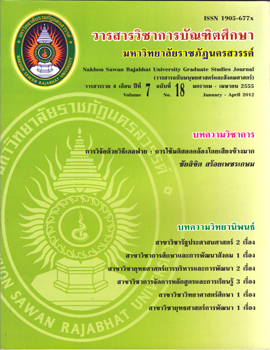การพัฒนาทุนทางสังคมของตำรวจไทย
Main Article Content
Abstract
บทคัดย่อ
การวิจัยครั้งนี้มีวัตถุประสงค์เพื่อ 1) ศึกษาระดับทุนทางสังคมของตำรวจไทยในปัจจุบัน 2) เปรียบเทียบระดับทุนทางสังคมของตำรวจไทยในปัจจุบันจำแนกตามปัจจัยภูมิหลังของตำรวจ 3) วิเคราะห์องค์ประกอบทุนทางสังคมของตำรวจไทย และ 4) ศึกษาแนวทางการพัฒนาทุนทางสังคมของตำรวจไทย กลุ่มตัวอย่างในการวิจัย คือข้าราชการตำรวจชั้นสัญญาบัตร จำนวน 1,000 คน ได้จากการสุ่มแบบแบ่งชั้น การศึกษาแนวทางการพัฒนาทุนทางสังคมของตำรวจไทย ใช้ระเบียบวิธีวิจัยเชิงคุณภาพโดยการวิจัยเอกสารและการสัมภาษณ์ ผู้ให้ข้อมูลสำคัญ คือข้าราชการตำรวจชั้นสัญญาบัตร จำนวน 18 คน เครื่องมือที่ใช้ในการวิจัย ได้แก่ 1) แบบบันทึกเอกสาร 2) แบบสอบถามและ 3) แบบสัมภาษณ์แบบกึ่งโครงสร้าง การวิเคราะห์ข้อมูล ใช้การวิเคราะห์เนื้อหา ค่าร้อยละ ค่าความถี่ ค่าเฉลี่ย ส่วนเบี่ยงเบนมาตรฐาน การทดสอบค่าที การวิเคราะห์ความแปรปรวนทางเดียว และเปรียบเทียบรายคู่โดยวิธี LSD และการวิเคราะห์องค์ประกอบ
ผลการวิจัยพบว่า ระดับทุนทางสังคมของตำรวจไทยในปัจจุบันอยู่ในระดับมาก จำแนกตามปัจจัยภูมิหลัง ของตำรวจ คือ อายุ วุฒิการศึกษา สถาบันการศึกษาในระดับปริญญาตรี ประสบการณ์การทำงาน ชั้นยศและสังกัด ภาพรวมแตกต่างกันอย่างมีนัยสำคัญทางสถิติที่ระดับ .05 ทุนทางสังคมของตำรวจไทยประกอบด้วย 6 องค์ประกอบ ได้แก่ 1) เครือข่ายทางสังคม 2) ความรับผิดชอบ 3) ความไว้วางใจ 4) วัฒนธรรมองค์กร 5) การสื่อสาร และ 6) ประสิทธิภาพและประสิทธิผลในการทำงาน ส่วนแนวทางการพัฒนาทุนทางสังคมของตำรวจไทยมีดังนี้คือ 1) จัดตั้งคณะกรรมการพัฒนาทุนทางสังคมของตำรวจไทย ให้มีภารกิจกำหนดนโยบาย แนวทางและกรอบแนวคิดในการจัดทำยุทธศาสตร์การ 2) จัดทำแผนที่ทุนมนุษย์ของสำนักงานตำรวจแห่งชาติ 3) โรงเรียนนายร้อยตำรวจพิจารณาทบทวนปรับปรุงหลักสูตรให้มีความทันสมัยยิ่งขึ้น 4) ศึกษาสภาพแวดล้อมของสำนักงานตำรวจแห่งชาติอย่างสม่ำเสมอ เพื่อการปรับเปลี่ยนวัฒนธรรมองค์กรในส่วนที่ไม่เกื้อกูลต่อความเจริญก้าวหน้าของตำรวจไทย 5) หน่วยงานในสำนักงานตำรวจแห่งชาติประกาศช่องทางการสื่อสารให้ชัดเจน รวมทั้งนำเทคโนโลยีต่างๆมาสนับสนุนระบบการสื่อสาร 6) นำกระบวนการของเกลียวความรู้มาดำเนินการเพื่อดึงความรู้และภูมิปัญญาที่อยู่ในตัวของตำรวจแต่ละคนออกมาเป็นความรู้และภูมิปัญญาที่เปิดเผย และ 7) แก้ไขกฎหมายว่าด้วยตำรวจให้เอื้อต่อการพัฒนาทุนทางสังคมของตำรวจไทย
ABSTRACT
The objectives of this research are 1) study the level of social capital of Thai police under The Royal Thai Police nowadays, 2) compare the level of social capital of Thai police according to individual backgrounds, 3) analyze the components of social capital of Thai police, and 4) develop the guidelines for improvement of social capital of Thai police. A sample group of 1,000 police were selected by stratified random sampling from the population of 33,225 populations who are commissioned police officers under The Royal Thai Police. Quantitative research is used in characterizing the levels of social capital with 18 commissioned police officers. Research tools are 1) document recording forms,2) questionnaires, and 3) quasi-structure interview forms. Data are analyzed by content analysis, percentage, frequencies, and mean value including standard deviation, t-test, One-way Analysis of Variance, LSD and factor analysis.
The results of this research showed that the level of social capital of Thai police nowadays was at the high level. The level of social capital of Thai police varied significantly according to individual backgrounds including age, education, bachelor degree institute, job experience, ranking and workplace at the .05 level. There was no significant difference between sex. According to analytical results concerning social capital of Thai police, it consisted of six components:1)social network, 2) responsibility,3) trust, 4 organizational culture, 5) communication, and 6) work efficiency and productivity. Moreover, the guideline for developing social capital should consist of all those 6 factors with following figures: 1) Set up Committee of Social Capital Development for Thai police to define a policy guideline and conceptual framework for strategic planning. 2) To make human capital map of The Royal Thai Police by surveying and setting information technology system. 3) Royal Police Cadet Academy should improve and update all curricula by adding ethic courses, focusing on practical learning and supporting teachers in academic work improvement for being a police knowledge hub. 4) To continuously study The Royal Thai Police’s context for Thai police development. 5) All sections in The Royal Thai Police should clearly announce communication channels including suportingly provide the new technology for communication system. 6) Using Knowledge Spiral or SECI Model to uncover tacit knowledge for all police so that they can easily approach that explicit knowledge. 7) To improve the law supporting social capital of Rayal Thai Police.


